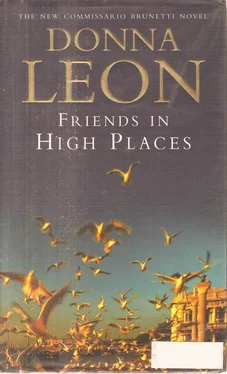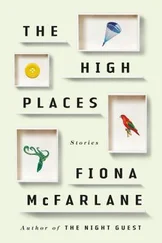Brunetti let another silence elapse and then asked, ‘How were they dressed?’
‘What, sir?’
‘How were they dressed? Like workers?’
‘I don’t know, sir. They were up at the window on the third floor, and we were looking up at them, so all we could see was their heads and shoulders.’ He thought about this and then said, ‘I think the one we talked to might have been wearing a jacket.’
‘Then why did you think he was a worker?’
‘Because he said he was, sir. Besides, why else would he be in the building?’
Brunetti had a good idea of why the men would have been in the building, but there was nothing to be served by mentioning it. He started to order the man to get his partner and go over and do a proper scene of crime exam but thought better of it. Instead he thanked the man for his information and hung up.
A decade ago, a conversation like this would have launched Brunetti into incandescent rage; now, however, it did nothing more than gently confirm his grim assessment of his fellow officers. In his blackest moments, he wondered if most of them were in the pay of the Mafia, but he knew this incident was nothing more than another example of endemic incompetence and lack of interest. Or perhaps it was a manifestation of what he felt himself: a growing sense that any attempt to obstruct, prevent, or punish crime was doomed to failure.
Rather than remain here, on his private Dunkirk, he locked the papers about the Volpatos in his drawer and left the office. The day attempted to lure him with the wiles of its beauty: birds sang brightly, the wisteria sent a special thread of sweetness across the canal toward him, and a stray cat came and wound itself around his legs. Brunetti bent and scratched the cat behind the ears, deciding what to do.
Out on the riva, he boarded the vaporetto that was heading towards the station and got off at San Basilio, then cut back toward Angelo Raffaele and the narrow calle where Rossi had lain. As he turned into the narrow street, he saw the building up ahead, but no sign of activity of any sort. No workers climbed on the scaffolding, and the shutters on the windows were pulled closed. He approached the building and had a closer look at the door. The padlock still held the metal chain in place, but the screws that fixed the metal flange to the frame of the door were loose, and the whole thing could easily be pulled out. He did this, and the door swung back on its hinges.
He stepped inside. Curious, he turned to see if he could do it, and yes, the screws holding the flange could be stuck back into the holes: the chain was long enough to allow the door to remain open a hand’s breadth while he did this. That done, he pulled the door closed and was safely inside: from outside, the house appeared securely locked.
He turned and found himself in a corridor. Stairs stood at the end, and he walked quickly towards them. Stone, they made no sound tinder his footsteps as he climbed up to the third floor.
He stopped for a moment at the top to orient himself, confused by having turned so many times on the stairs. Light filtered in from his left, so he assumed that must be the front of the house and turned towards it.
A sound came from above him, muffled and soft, but definitely a sound. He froze and wondered where he’d left his pistol this time: locked in the metal box at home, in his locker at the shooting range, or in the pocket of the jacket he’d left hanging in the closet of his office. Futile to think about where it might be when he was certain about where it was not.
He waited, breathing through his mouth, and had the distinct sensation that there was some sort of presence above him. Stepping over an empty plastic bottle, he moved into a doorway on his right and stood just inside. He glanced at his watch: six twenty. Soon it would begin to grow dark outside: it was already dark inside, save for the light that filtered through from the front of the house.
He waited: Brunetti was good at waiting. When he looked at his watch again, it was six thirty-five. Again, the sound from above, somewhat closer and more distinct. A long pause, and then the soft sound came down the stairs towards him, this time the unmistakable noise of a footfall on the wooden steps coming down from the attic.
He waited. The little light that filtered in turned the staircase into a hazy mist where Brunetti could perceive only the absence of being. He shifted his eyes to the left of the sound and perceived the grey ghost of a descending presence. He closed his eyes and slowed his breathing. At the next sound, which seemed to come from the landing just in front of him, he opened his eyes, perceived the vaguest of forms, and stepped suddenly forward, shouting as loudly as he could, ‘Stop! Police!’
There was a scream of pure, animal terror, and then whatever it was fell to the floor at Brunetti’s feet and continued to emit a piercing, high-pitched noise that caused the short hair on the back of Brunetti’s neck to bristle.
He stumbled toward the front of the house and pulled open a window, then pushed open the wooden shutters to let the failing light of the day enter the room. Momentarily blinded, he turned and made his way back towards the doorway, from which the noise still came, lower now, less terrified, and more identifiably human.
The instant Brunetti saw him there, cowering full length on the ground, his arms wrapped around his thin body to protect it from the expected kicks or blows and his neck pulled down into his shoulders, he recognized the young man. He was one of a trio of drug addicts, all in their early twenties, who had for years spent their days near or in Campo San Bortolo, going from bar to bar, growing more out of touch with reality as day passed into night and year into year. This was the tallest of them, Gino Zecchino, frequently arrested for drug dealing and often for assault or making threats to strangers. Brunetti hadn’t seen him in almost a year and was struck by his physical deterioration. His dark hair was long and greasy, no doubt disgusting to the touch, and his front teeth were long gone. Deep hollows were visible above and below his jawbone, and he looked as though he hadn’t eaten for days. From Treviso, he had no family in the city and lived with his two friends in an apartment behind Campo San Polo with which the police were long familiar.
‘You’ve done it this time, Gino,’ Brunetti shouted at him. ‘Get up, get on your feet.’
Zecchino recognized his name but not the voice. He stopped whimpering and turned his face towards the sound. But he didn’t move.
‘I said get up!’ Brunetti shouted, in Veneziano, forcing as much anger as he could into his voice. He looked down at Zecchino; even this dim light showed the scabs on the back of his hands where he’d tried to find the veins. ‘Get up before I kick your ass down the stairs.’ Brunetti was using language he’d spent his life listening to in bars and police cells, anything to keep the adrenalin of fear pumping in Zecchino’s veins.
The young man rolled on to his back and, body still protected by his arms, turned his head, eyes shut, towards the voice.
‘Look at me when I talk to you,’ Brunetti ordered.
Zecchino pushed himself back against the wall and looked up through slitted eyes at Brunetti, who towered in the shadows above him. With a single, fluid gesture, Brunetti leaned down over the young man, grabbed two handfuls of the front of his jacket, and pulled him to his feet, surprised at how easy it was.
When he got close enough to Brunetti to recognize him, Zecchino’s eyes opened wide in terror and he began to chant, ‘I didn’t see anything. I didn’t see anything. I didn’t see anything.’
Roughly, Brunetti pulled the young man towards him, all the time shouting into his face, ‘What happened?’
Читать дальше











